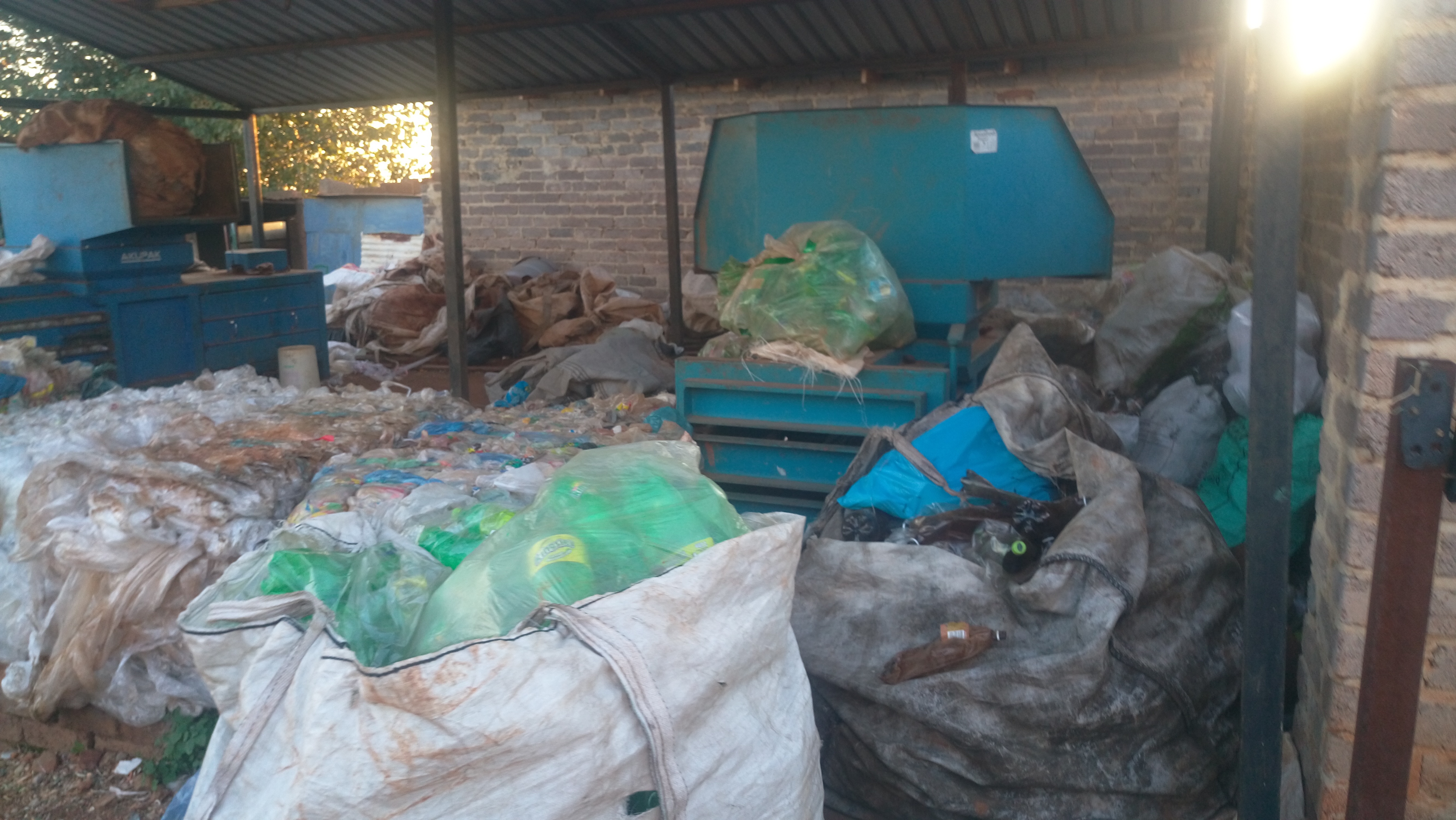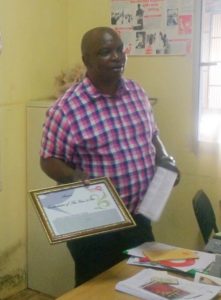
I was excited by my visit to Orange Farm in South Africa. This was an opportunity to realize my dream of seeing in person a community paralegal project that could generate its own income. I have worked in the development sector a long time and know that dependence on grants from donors is a constant source of worry for most paralegal projects – the funds are small, inconsistent and require a lot of work to access.
Orange Farm is not your typical farm. It is a community project that includes a pre-school, a garbage-recycling center, a farm, a welding project, and a paralegal advice center. It is headed by one Mr. Bricks, as he is widely known. He is also the chair of the Association of Community Advice Offices of South Africa (ACAOSA) in Gauteng. He is a very down-to-earth gentleman who, if you came on an ordinary day, you would have thought to be one of the workers in the compound – most of the time he wears his welding overalls and blends in with the rest of his employees.
 Mr. Bricks was more than happy to accommodate my visit and answer my questions. The farm, he told me, was started as early as 1987. The land was previously an unofficial dumping site. No one laid claim to it. Mr. Bricks decided to mobilize the community to secure the land for the establishment of income-generating projects that would reduce the level of unemployment in the area. They fenced the land and went to apply for the title deed.
Mr. Bricks was more than happy to accommodate my visit and answer my questions. The farm, he told me, was started as early as 1987. The land was previously an unofficial dumping site. No one laid claim to it. Mr. Bricks decided to mobilize the community to secure the land for the establishment of income-generating projects that would reduce the level of unemployment in the area. They fenced the land and went to apply for the title deed.
The community was able to pressure the city council until the mayor granted them the deed and constructed a temporary community building. It began with one hall, then the farm, then the school and the garbage-recycling project. Now the project employs over 15 youths and women. Among them are the paralegals who, since 1994, have been advising the community on legal issues such as labor rights and migrant issues, as well as educating the community on the proposed changes to the South African constitution prior to the 1996 referendum.
So how does the community paralegal advice center benefit from the project? Mr. Bricks explained: “After assisting our clients and they offer to pay us, we ask them to give us their waste products – like plastics and glass – instead. And that’s what we use to make the money in return.” Imagine giving out rubbish as payment for services.
The community is also encouraged to continue using the place as a dumping site. The waste is later sorted into different categories for processing. The glass bottles are crushed and packed separately, the cans are sorted on the basis of materials, and the plastics are sorted in terms of color, their numbers, and quality for easy processing. The after products are later supplied to processing companies based on their needs – and the market is big. In addition to generating revenue for the paralegal center, the recycling project helps reduce the pollution of the environment.
Mr. Bricks says that 25% of the income from the recycling and other projects on the farm are used to finance the advice center’s operation costs. I asked if the project could comfortably run without donor funding, and the response: “Mustafa, during our conversation, have I mentioned or complained about funding?” It was true, during the entire visit Mr. Bricks had not complained about a shortage of funding. I can say from my experience that this is uncommon. Other paralegal centers, ones that depended on donor or government funding, regularly voice their funding distress.
What is more, on Orange Farm, the paralegals themselves work on the other projects so they have a source of income. “You have to make your paralegals masters in everything; equip them with other skills for their survival,” says Mr. Bricks. He has partnered with the North West University engineering department who train four youths from the farm every year on welding and engineering skills. The paralegals are among them.
The schools and the building the mayor constructed were also designed for free by volunteer students studying architecture and design.
The project is also unique in that it was community initiated and is still owned by the community and run, in trust, by him. During our conversation, Mr. Bricks kept insisting that community ownership is the most sustainable approach for any project. The community has a say in all decisions at Orange Farm, and because of this, he says, it stands by the farm in difficult times.
Before I left the center, Mr. Bricks made me smile one last time – by mocking how we paralegals and paralegal managers like white collar jobs. “Paralegals like dressing in suits and ties and just sit at the desks thinking they have the solutions to everyone’s problems. Let the community take the initiative and you just advise them, and you will see how easy your work will be. You don’t need to do everything for them, they just need you assistance, not your control.” I believe he is right: we all make this mistake occasionally; we believe we are the community, but the community is greater than us.
My trip to Orange Farm was an eye opener. I wish I could say it finally brought closure to my quest for a full understanding of self-sustainability, but unfortunately I find I still have questions. I will continue with my search until I am able to track how a small project that set up a commercial printing press to help finance its activities became the largest non-governmental development organization in the world, as is the case of BRAC. But from the example of Orange Farm and Mr. Bricks, we NGO practitioners can learn that we have a lot of idle, under-utilized resources around us in the form of land and networks, and other opportunities to support our financing and operations. With a little creative thinking and initiative, we can all lessen our dependence on donor funding.